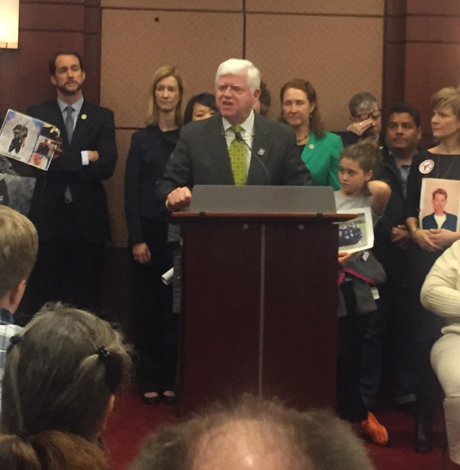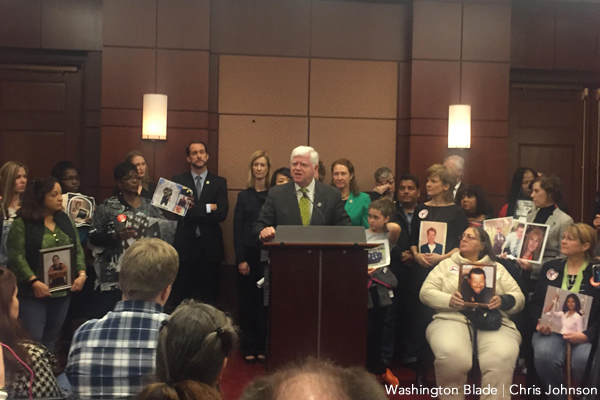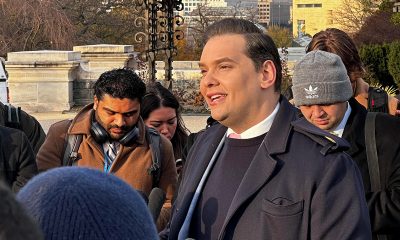News
LGBT group joins call to ‘honor with action’ victims of gun violence
Family of victims tell stories day after House passes concealed carry bill


Rep. John Larson is joined y gun control advocates at a news conference (Washington Blade photo by Chris Johnson)
One day after the U.S. House approved legislation allowing concealed carry of firearms across state lines, gun control advocates — including an LGBT group — took to Capitol Hill to decry the move and to “honor with action” the lives of Americans lost to ongoing gun violence.
Representing an LGBT voice at the news conference Thursday was Taylor Houston, communications director for the Pride Fund to End Gun Violence.
Houston recalled the massacre at a gay nightclub in Orlando, Fla., was once the worst mass shooting in modern U.S. history, but things have changed with the mass shooting in Las Vegas, which this year surpassed the death toll in Orlando, as well as other incidents.
“America is the only developed country in this entire world that faces this public health crisis,” Houston said. “We’re supposed to be leading the world when it comes to the quality of life that we ensure our citizens.”
Houston said the United States has experienced 1,500 mass shootings since the Sandy Hook shooting in 2012 and 142 of them have been school shootings.
“So we’re fighting here with Pride Fund, we’re fighting with gun safety measures everyday with everything that we have,” Houston said. “We’re doing it for the 20 children that were gunned down an six staffers in the room of Sandy Hook, we’re doing it for the Pulse victims and 58 Las Vegas and the other 33,000 Americans who will lose their lives this year.”
During a somber portion of the news conference, family and friends of the victims of gun violence stood up to the podium one by one to name the victim they knew and called on Congress to “honor with action” their memory.
Among them were parents who lost their daughter at the 2012 theater shooting in Aurora, Colo., individuals who lost loved to suicide by gun death, a parent whose daughter was shot in the heart in a mass shooting, parents whose daughter who shot several times during a 2010 home invasion in Portland, Maine, a pastor whose mother was shot and killed in front her other daughters and whose niece was lost to gun violence, and a mother who lost her son to gun violence while he out celebrating graduation from paramedic school.
Sen. Chris Murphy (D-Conn.), who has made gun safety a signature issue, the stories were an “impossible act to follow,” but took the opportunity to lament legislative inaction and accused Congress of letting the violence happen.
“Congress has unfortunately become complicit in these murders because our silence has started to look like an endorsement,” Murphy said. “People notice when the leaders of this country do nothing in the face of slaughter, after slaughter, after slaughter.”
But Murphy cited a number of factors which he said indicate things are changing, such as Democratic victories on Election Day 2017 in Virginia after voters cited gun violence as their No. 2 reason for going to the polls.
On Tuesday, the House passed legislation, 231-198, that would allow people with permits for carrying concealed handguns to do so in other states that allow concealed weapons. The interstate concealed carry would require an individual to carry a valid government-issued photo ID and be lawfully licensed to possess a concealed handgun.
The package also contained a measure that would ensure authorities report criminal history records to the National Instant Criminal Background Check System, penalizing agencies that don’t report them to the FBI.
Rep. Elizabeth Esty (D-Conn.) spoke angrily about the passage of the House bill, saying it amounts lawmakers having “dishonored with action” the victims of gun violence.
“The House leadership chose to bring up a bill which we might as well rename ‘The Guns Anywhere, Anytime by Anyone,'” Esty said. “It is wrong, and the American people need to stand up.”
Sen. Richard Blumenthal (D-Conn.) asserted the House-passed legislation “will not pass the United States Senate” and anticipated separation of the bill into parts — one expanding checks, one for concealed carry — because that was the “good faith” agreement with Senate leadership and Republican.
“That’s sort of the bare minimum,” Blumenthal said. “It’s barely progress. What we need to extend those background checks to all purchases, to make sure we ban assault weapons, to ban high capacity magazines.”
Blumenthal added “we will prevail” because of gun control advocates “are breaking the vice-like grip of the NRA and the gun lobby.”
Other lawmakers who spoke were Reps. John Larson (D-Conn.), Jim Himes (D-Conn.), Brent Thompson (D-Calif.). Joining them were from Po Murray, chair of Newtown Action Alliance; Avery Gardiner, co-president of the Brady Campaign to Prevent Gun Violence; Victoria Coy, national director of States United to Prevent Gun Violence; and Robin Lloyd, director of government affairs for Giffords.
The news conference took place hours before another shooting in Aztec High School in New Mexico that left two students and the suspect dead.

Texas state Rep. James Talarico won a hard-fought primary Tuesday to become the state’s Democratic nominee for U.S. Senate, defeating U.S. Rep. Jasmine Crockett in one of the year’s most closely watched and competitive Democratic contests.
Talarico, a Presbyterian seminarian and three-term lawmaker from Round Rock, was declared the winner by the Associated Press early Wednesday morning after a closely tracked vote count that drew national attention.
“Tonight, the people of our state gave this country a little bit of hope,” Talarico told the AP. “And a little bit of hope is a dangerous thing.”
With 52.8% of the vote to Crockett’s 45.9%, Talarico secured the nomination outright, avoiding a runoff and capping months of sharp contrasts between the two candidates over strategy, messaging, and how best to compete statewide in Texas. Democrats hope the competitive primary — and the relatively narrow margin — signals growing momentum in a state that has not elected a Democrat to the U.S. Senate since 1988.
Talarico has long expressed support for the LGBTQ community, a position he highlights prominently on his campaign website. Under the “Issues” section, he directly addresses assumptions that might arise from his faith and background as a seminarian in a deeply conservative state.
“My faith in Jesus leads me to reject Christian Nationalism and commit myself to the project of democracy,” his website reads. “Because that’s the promise of America: a democracy where every person and every family — regardless of religion, race, gender, sexual orientation, or any other difference between us — can truly be free and live up to their full potential.”
Crockett struck a conciliatory tone following her defeat, emphasizing party unity ahead of November.
“This morning I called James and congratulated him on becoming the Senate nominee,” Crockett told Politico. “Texas is primed to turn blue and we must remain united because this is bigger than any one person. This is about the future of all 30 million Texans and getting America back on track.”
Talarico also drew national attention earlier in the race when “Late Show” host Stephen Colbert said he was initially unable to air an interview with the state legislator due to potential FCC concerns involving CBS. The episode sparked a broader political debate.
Brendan Carr, chair of the Federal Communications Commission, appointed by President Donald Trump, told reporters the controversy was a “hoax,” though he also acknowledged Talarico’s ability to harness the moment to build support as an underdog candidate. The interview was later released online and garnered millions of views, boosting Talarico’s national profile.
In November, Talarico will face the winner of the Republican primary between incumbent Sen. John Cornyn and Texas Attorney General Ken Paxton, who have been locked in a bruising GOP contest. Rep. Wesley Hunt was also in the Republican primary field. The GOP race is expected to head to a May runoff.
In a joint statement, Senate Minority Leader Chuck Schumer and Democratic Senatorial Campaign Committee Chair Kirsten Gillibrand praised Talarico’s victory and framed him as a candidate capable of broad appeal.
“As an eighth-generation Texan, former middle school teacher, and Presbyterian seminarian, James will be a fighter for Texans from all walks of life and of all political stripes,” they said. “In November, Texans will elect a champion for working people: James Talarico.”
Maryland
Md. Commission on LGBTQIA+ Affairs released updated student recommendations
LGBTQ students report higher rates of bullying, suicide

The Maryland Commission on LGBTQIA+ Affairs has released updated recommendations on how the state’s schools can support LGBTQ students.
The updated 16-page document outlines eight “actionable recommendations” for Maryland schools, supplemented with data and links to additional resources. The recommendations are:
- Developing and passing a uniform statewide and comprehensive policy aimed at protecting “transgender, nonbinary, and gender expansive students” against discrimination. The recommendation lists minimum requirements for the policy to address: name, pronoun usage, and restroom access.
- Requiring all educators to receive training about the specific needs of LGBTQ students, by trained facilitators. The training’s “core competencies” include instruction on terminology, data, and support for students.
- Implementing LGBTQ-inclusive curricula and preventing book bans. The report highlights a “comprehensive sexual education curriculum” as specifically important in the overall education curriculum. It also states the curriculum will “provide all students with life-saving information about how to protect themselves and others in sexual and romantic situations.”
- Establishing Gender Sexuality Alliances “at all schools and in all grade levels.” This recommendation includes measures on how to adequately establish effective GSAs, such as campaign advertising, and official state resources that outline how to establish and maintain a GSA.
- Providing resources to students’ family members and supporters. This recommendation proposes partnering with local education agencies to provide “culturally responsive, LGBTQIA+ affirming family engagement initiatives.”
- Collecting statewide data on LGBTQ youth. The data on Maryland’s LGBTQ youth population is sparse and non-exhaustive, and this recommendation seeks to collect information to inform policy and programming across the state for LGBTQ youth.
- Hiring a full-time team at the Maryland Department of Education that focuses on LGBTQ student achievement. These employees would have specific duties that include “advising on local and state, and federal policy” as well as developing the LGBTQ curriculum, and organizing the data and family resources.
- Promoting and ensuring awareness of the 2024 guidelines to support LGBTQ students.
The commission has 21 members, with elections every year, and open volunteer positions. It was created in 2021 and amended in 2023 to add more members.
The Governor’s Office of Communication says the commission’s goal is “to serve LGBTQIA+ Marylanders by galvanizing community voices, researching and addressing challenges, and advocating for policies to advance equity and inclusion.”
The commission is tasked with coming up with yearly recommendations. This year’s aim “to ensure that every child can learn in a safe, inclusive, and supportive environment.”
The Human Rights Campaign’s most recent report on LGBTQ youth revealed that 46.1 percent of LGBTQ youth felt unsafe in some school settings. Those numbers are higher for transgender students, with 54.9 percent of them saying they feel unsafe in school.
Maryland’s High School Youth Risk Behavior Survey reveals a disparity in mental health issues and concerns among students who identify as LGBTQ, compared to those who are heterosexual. LGBTQ students report higher rates of bullying, feelings of hopelessness, and suicidal thoughts. Nearly 36 percent of LGBTQ students report they have a suicide plan, and 26.7 percent of respondents say they have attempted to die by suicide.
The commission’s recommendations seek to combat the mental health crisis among the state’s LGBTQ students. They are also a call for local and state governments to work towards implementing them.
Virginia
Va. lawmakers consider partial restoration of Ryan White funds
State Department of Health in 2025 cut $20 million from Part B program

The Virginia General Assembly is considering the partial restoration of HIV funding that the state’s Department of Health cut last year.
The Department of Health in 2025 cut $20 million — or 67 percent of total funding — from the Ryan White Part B program.
The funding cuts started with the Trump-Vance administration passing budget cuts to federal HIV screening and protection programs. Rebate issues between the Virginia Department of Health and the company that provides HIV medications began.
Advocates say the funding cuts have disproportionately impacted lower-income people.
The Ryan White HIV/AIDS Program, a federal program started in 1990, provides medical services, public education, and essential services. Part B offers 21 services, seven of which remained funded after the budget cuts.
Equality Virginia notes “in 2025, a 67 percent reduction severely destabilized HIV services across the commonwealth.”
Virginia lawmakers have approved two bills — House Bill 30 and Senate Bill 30 — that would partially restore the funding. The Ryan White cuts remain a concern among community members.
Both chambers of the General Assembly must review their proposed changes before lawmakers can adopt the bills.
“While these amendments aren’t a full restoration of what community-based organizations lost, this marks a critical step toward stabilizing care for thousands of Virginians living with HIV,” said Equality Virginia Executive Director Narissa Rahaman. “Equality Virginia plans to continue their contact with lawmakers and delegates through the conference and up until the passing of the budget.”
“We appreciate lawmakers from both sides of the aisle who recognized the urgency of this moment and will work to ensure funding remains in the final version signed by the governor,” added Rahaman.



















